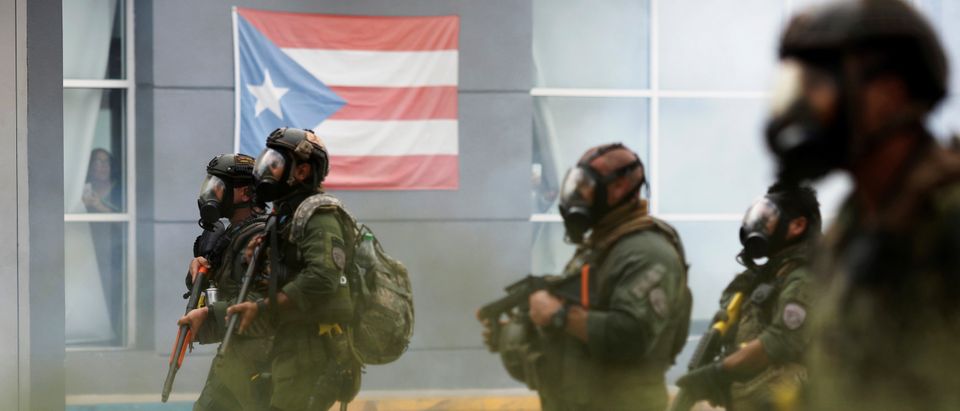At the end of June, Resident-Commissioner Gonzalez-Colon introduced legislation that would start Puerto Rico on a path to Statehood. Advocates such as former Puerto Rico Attorney General Jose Fuentes have argued that Statehood will be a boon for economic growth and help rid the island of its gargantuan debts. His claims go down like a lead balloon.
For starters, Puerto Rico is not close to being ready to be a state. Puerto Rico — unwilling to pay its debts — went to Washington requesting a tailor-made bankruptcy process to avoid paying the island’s $70 billion debt and $50 billion pension liabilities.
In a complete disconnection with fiscal responsibility, the island’s Clinton delegate and pro-Statehood governor, Ricardo Rosselló, has gone as far as failing to account for debt service in the Commonwealth’s annual budget. Governor Rosselló is mistaken if he believes states do not pay their debts.
The economic effects of statehood for Puerto Rico would also be devastating. In seeking statehood, Puerto Rico will have to pay at least $5 billion in federal taxes each year as estimated by the Government Accountability Office (GAO). That is more than half of the government’s allocated budget. The $5 billion in federal taxation would only increase Puerto Rico’s dependency on federal funds.
Moreover, the GAO estimated that federal taxation could cost Puerto Rico 70 percent of its manufacturing base (which constitutes 50 percent of its economy). This would be exacerbated by a massive $20 billion increase in Medicaid spending. The tax-and-spend debt spiral Puerto Rico is in now would be worse with Statehood.
Do we really think Puerto Rico will pay — or can pay — federal taxes? This kind of double talk is an example of why Puerto Rico simply does not act like a state.
Furthermore, there is endemic, institutional corruption inside the Puerto Rican government.
In September of 2017, Hurricane Maria completely ravaged Puerto Rico, shutting down the island and imposing a blackout devastating the island for almost a year already. Shortly after the hurricane dissipated, the governor assured the island’s residents that electricity would be fully restored by the end of 2017.
In seeing this promise, the Rosselló administration created and signed in the dark of night a contract with a little Montana firm called Whitefish Energy. This ill-conceived and non-competitively awarded contract likely set the island back by months in restoring electricity and has led to a federal investigation. Following nationwide outrage and congressional scrutiny, Puerto Rico canceled the bogus contract.
Unfortunately, they did not learn their lesson.
In December, Puerto Rico inked a $133 million (FEMA funded) deal with a firm called Adjusters International to repair destroyed homes across the island. In the months following that decision, revelations emerged that the contract was doled out to the firm without verifying the company’s bank balance or credit line.
Furthermore, the Puerto Rico housing agency improperly awarded bonus “points” for having an agreement with a local call center company.
In addition, in late December, the governor was forced to admit he was hiding $6.9 billion in more than 800 different bank accounts from creditors and other stakeholders. Further, leaked documents reveal that the Oversight Board — hand-picked by President Obama and led by a Republican statehood supporter, José Carrión — knew about the secret accounts since July 2017 and did nothing.
In desperation, the governor has attempted to blame the lack of Statehood for his own failures of leadership. Congress should not be taken in by Rossello’s transparent attempt to blame his failures on a culture of corruption and malfeasance.
There are serious questions about a statehood vote in 2017 that was boycotted by everyone but Rossello’s own party. Instead of the normal 80-percent turnout, it was a meager 22 percent because he excluded the current Commonwealth status.
Rosselló and Oversight Board Chairman Carrión’s attempts to find a scapegoat for their problems — such as statehood — is an example of their stunning lack of fiscal responsibility and mature leadership.
Instead of trying to force Puerto Rico further into the tax-and-spend paradigm that has proven so wrongheaded, Rosselló and Carrión should offer constructive leadership, do deals with creditors and put forth free-market reforms that put the island on the right track.
Statehood would be merely doubling down on nefarious past practices.
Ross Marchand is the director of policy at the Taxpayers Protection Alliance.
The views and opinions expressed in this commentary are those of the author and do not reflect the official position of The Daily Caller.


